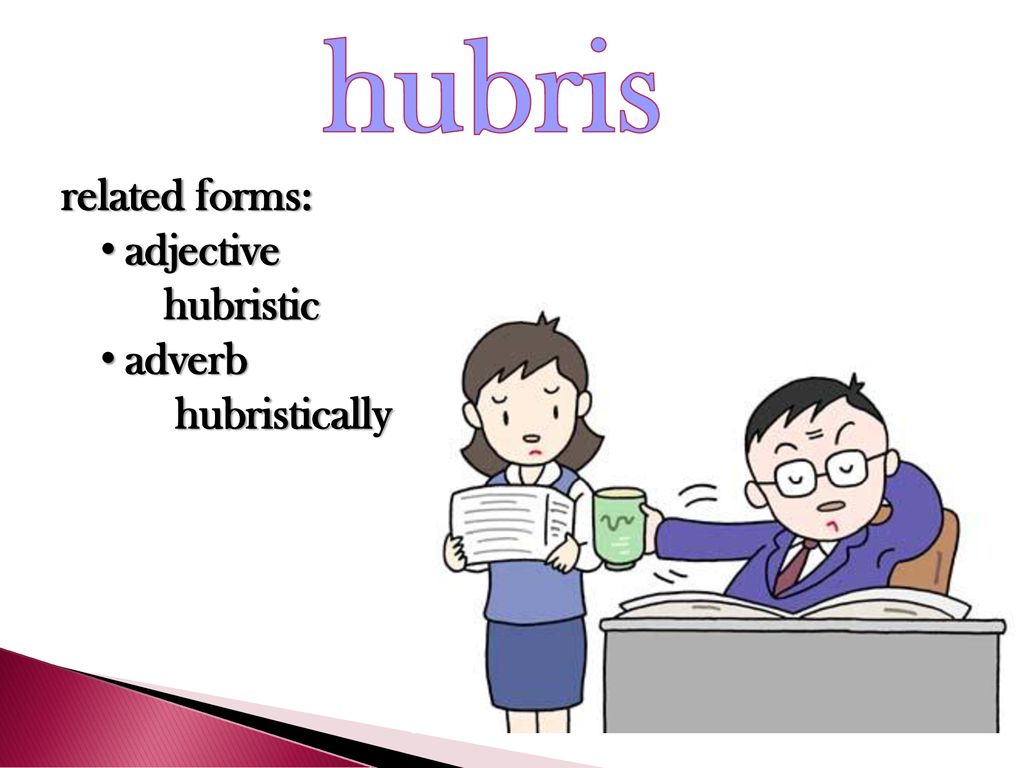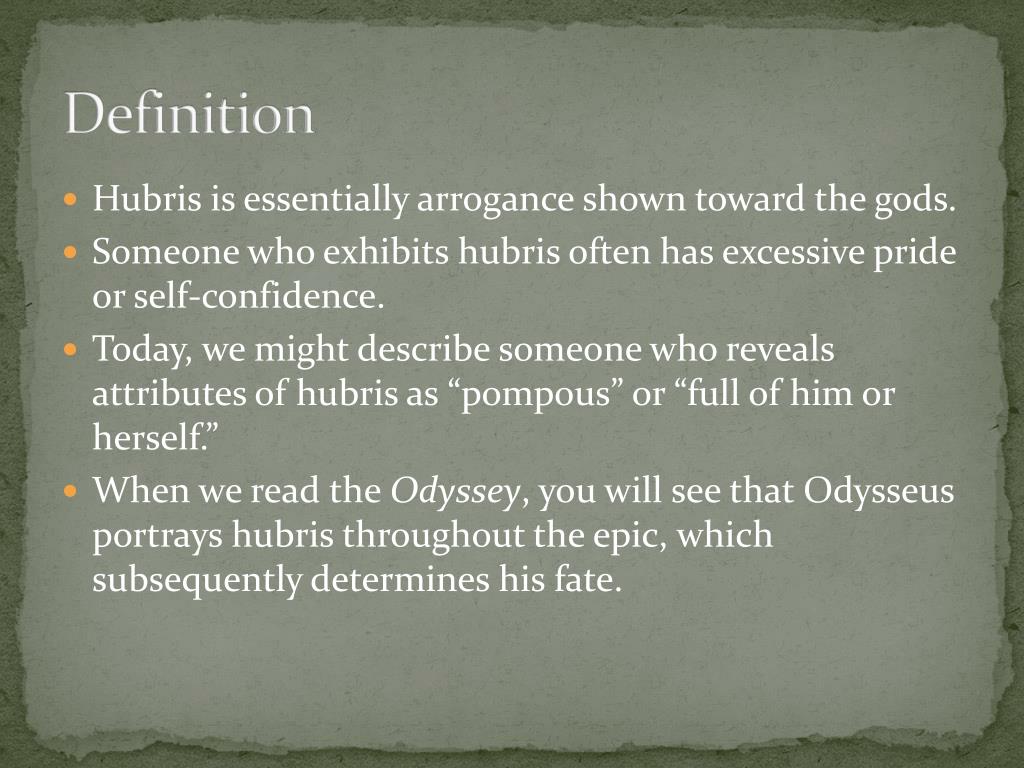The Peril Of Pride: Unpacking Hubris Meaning And Its Downfall
Have you ever witnessed someone so overwhelmingly confident, so absolutely certain of their own invincibility, that you just knew they were headed for a spectacular fall? That feeling, that instinct, often points to a concept as old as civilization itself: hubris. It's a word that carries the weight of history, echoing from ancient Greek tragedies to modern-day cautionary tales, and understanding its true nature is key to navigating life's challenges.
The term hubris meaning delves deep into the human psyche, describing an extreme or excessive pride that transcends healthy self-esteem and ventures into dangerous overconfidence. This isn't merely about being proud of an accomplishment; it's about a profound arrogance that often leads to a disregard for limits, consequences, and even reality itself. Let's embark on a journey to explore this powerful concept, its origins, evolution, and enduring relevance in our world.
Table of Contents
- The Ancient Roots of Hubris: From Greek Mythology to Moral Philosophy
- The Evolution of Hubris Meaning: From Outrage to Overweening Presumption
- Key Characteristics of Hubris: Recognizing the Signs
- Hubris in Literature and Media: Classic Examples
- The Real-World Impact of Hubris: Modern Day Cautionary Tales
- Avoiding the Pitfalls of Hubris: Cultivating Humility and Self-Awareness
- Hubris vs. Confidence: Drawing the Line
- Pronunciation and Usage: How to Use Hubris in a Sentence
The Ancient Roots of Hubris: From Greek Mythology to Moral Philosophy
To truly grasp the hubris meaning, we must journey back to its origins in ancient Greece. The word itself, ὕβρις (húbris), comes directly from this era, where its initial connotations were even more severe than our modern understanding. In ancient Athens, hubris wasn't just about pride; it specifically referred to the intentional use of violence to humiliate or degrade another person. It was an act of outrageous insolence, a transgression against the social order and often, against the gods themselves.
- Insta Influence Mms
- Lola Jade Fielder Civil
- Hdhub4you
- Mkvmoviespoint All Quality And Hindi Dubbed Download
- Vegamovies2160p
The ancient Greeks believed in a cosmic order, a divinely fixed set of limits on human action. When an individual committed hubris, they were seen as violating these sacred bounds. This transgression was not to go unpunished. The gods, particularly Nemesis, the goddess of divine retribution, would ensure that such excessive pride was met with a swift and often tragic downfall. This concept is central to Greek tragedy, where protagonists, blinded by their own greatness, challenge the natural order and inevitably face catastrophic consequences. It's a powerful lesson that still resonates: no mortal is above the universal laws, and to believe otherwise is to invite disaster.
The Evolution of Hubris Meaning: From Outrage to Overweening Presumption
Over time, the word’s connotation changed, evolving from a specific act of violent humiliation to a broader concept of overweening presumption. While its Greek roots still emphasize excessive pride, the focus shifted from physical outrage to a dangerous mental state. The hubris meaning expanded to encompass an arrogant pride or excessive ambition that leads a person to disregard the divinely fixed limits on human action in an ordered cosmos.
This evolution highlights a crucial aspect: hubris isn't just about being proud; it's about a pride so profound that it makes one believe they are above the rules, above criticism, and even above fate. It's an excess of confidence that blinds an individual to their own fallibility and the potential for failure. We no longer have the Greek gods to mete out immediate punishment, so in modern contexts, the consequences of hubris often manifest as self-inflicted downfall, reputational damage, or catastrophic failures in various aspects of life. The core principle remains: unchecked pride leads to ruin.
Key Characteristics of Hubris: Recognizing the Signs
Understanding the hubris meaning requires us to identify its tell-tale signs. It's more than just confidence; it's a dangerous distortion of self-perception that can have profound consequences.
Excessive Confidence and Arrogance
At its core, hubris is an excess of confidence. It's not the healthy belief in one's abilities that fosters success, but rather an inflated sense of self that borders on delusion. Think of a boxer who shouts, "I'm the greatest!" even though he's about to get pummeled by a much stronger opponent. This isn't self-motivation; it's displaying a lot of hubris. This arrogance often manifests as:
- Unrealistic Self-Appraisal: Believing one is far more capable, intelligent, or important than they actually are, often without objective evidence.
- Dismissal of Advice: Ignoring warnings, expert opinions, or constructive criticism from others, believing they know best and are beyond reproach.
- Boastfulness and Grandiosity: Openly proclaiming one's superiority, often without sufficient evidence or in inappropriate contexts, seeking constant validation.
- Lack of Empathy: A reduced ability to understand or share the feelings of others, as their own self-importance overshadows everything else, leading to insensitivity.
Disregard for Limits and Consequences
Perhaps the most dangerous characteristic of hubris is the inherent disregard for limits. This can be limits set by society, by nature, by morality, or even by one's own physical and mental capabilities. The individual suffering from hubris believes they are exempt from normal constraints, viewing rules as applicable only to others. This disregard can lead to:
- Reckless Decision-Making: Taking unnecessary risks because they believe they are immune to failure, often with severe repercussions for themselves and others.
- Ethical Lapses: Crossing moral or legal boundaries, convinced that rules don't apply to them, leading to corruption or misconduct.
- Ignoring Red Flags: Failing to see or acknowledge impending problems because their overconfidence blinds them to reality, preventing timely intervention.
- Pushing Boundaries Too Far: Constantly seeking to expand their influence or power without considering the potential negative repercussions, leading to overreach.
Hubris in Literature and Media: Classic Examples
The concept of hubris meaning has been a cornerstone of storytelling for millennia, serving as a powerful narrative device to explore the human condition and the consequences of unchecked ambition. From ancient Greek tragedies to modern blockbusters, characters exhibiting hubris often provide the most compelling and tragic arcs. Learning the origin, history, and function of hubris in media and literature helps us to understand its profound impact on narrative and human behavior.
- Oedipus Rex: Perhaps the quintessential example from Greek tragedy. Oedipus, despite his intelligence and initial success, displays hubris by believing he can outwit fate and the gods' prophecies. His relentless pursuit of the truth, despite warnings, leads him to uncover a horrifying reality and ultimately, his own downfall.
- Dr. Frankenstein (Frankenstein by Mary Shelley): Victor Frankenstein's hubris lies in his ambition to transcend the natural limits of creation. He believes he can play God, creating life from death, without considering the moral implications or the potential consequences of his actions. His creation, and the subsequent suffering it causes, is a direct result of his overweening presumption.
- Captain Ahab (Moby Dick by Herman Melville): Ahab's obsessive pursuit of the white whale, Moby Dick, embodies hubris. He defies reason, risks his crew's lives, and challenges the very forces of nature, driven by an arrogant desire for revenge and mastery over the untamable. His ultimate demise, and that of his ship, is a tragic testament to his unchecked pride.
- Tony Montana (Scarface): A more modern example, Tony Montana's rise and spectacular fall are fueled by his insatiable ambition and belief in his own invincibility. He disregards all warnings, alienates those closest to him, and believes he can control everything, leading to his violent and isolated end.
These examples illustrate a consistent pattern: hubris, in its various forms, sets characters on a collision course with reality, leading to their inevitable undoing. They serve as powerful cautionary tales, reinforcing the idea that excessive pride often leads to downfall.
The Real-World Impact of Hubris: Modern Day Cautionary Tales
While we no longer have the Greek gods directly punishing hubris, its consequences are very much real and observable in contemporary society. The hubris meaning extends beyond literary analysis into the practical realities of our lives, impacting individuals, organizations, and even nations.
In Business and Politics
History is replete with examples of leaders and organizations brought down by hubris. A CEO who believes their company is too big to fail might ignore market shifts or ethical concerns, leading to corporate collapse. This dangerous overconfidence can manifest as a refusal to adapt, an unwillingness to listen to dissenting voices, or a blind pursuit of growth at all costs. Consider the dot-com bubble burst, where many companies, fueled by excessive confidence in their rapid growth, disregarded traditional business metrics, leading to spectacular failures and widespread economic disruption.
Similarly, in politics, a leader convinced of their own infallible judgment might push through disastrous policies or engage in corrupt practices, ultimately losing public trust and power. The belief that one is exempt from accountability or immune to public opinion is a classic manifestation of hubris, often resulting in significant social unrest, political instability, and historical censure. In these contexts, hubris is arrogant pride or excessive ambition that leads to downfall, affecting not just the individual but countless others and the very fabric of society.
In Personal Life and Relationships
On a more personal level, hubris can erode relationships and hinder personal growth. An individual who believes they are always right, refuses

Hubris: Definition and Examples of Hubris in Spoken Conversation

Hubris Definition

Hubris Definition